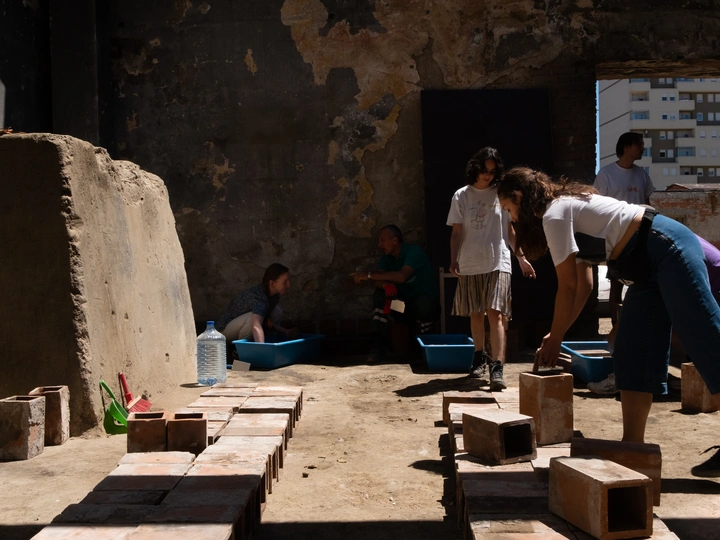Making conviviality trough Recentralizing energy.

Andries De Lange is a Berlin-based practitioner in socio-spatial, material, and urban realms, showcasing collaborative social design through non-linear, interdisciplinary approaches. This entails co-building, creating, and designing to foster awareness for a more empathetic, intersectional eco-social future for both humans and non-humans. Grounded in re-materializing and non-extractive practices, the process involves material and spatial activation to regenerate different layers of society through ecological, cultural, and social lenses. They view design as a means to forge social connections and advancement, embodied in empathetic, intersectional eco-social beliefs.
Centred on critical issues and explored through experiments, trials, and process-driven design, they believe design is an ongoing process, shaped by its cultural context. Their interest lies not in finalized designs but in the act of constructing, activating, and progressing through co-building, creating, and designing.
Practically, Andries De Lange operates as a collaborative socio-design studio, initiating and contributing to collaborative projects, and freelance work, and plays an integral role in the international Constructlab Collective. Their diverse practical experiences span tutoring workshops to collaborative constructions and urban artistic interventions. They have participated in events such as the Manifesta Biennial 14 in Pristina, Dutch Design Week in Eindhoven, Brucke Museum in Berlin, and more, collaborating with various collectives, including Raumlabor, Urbane Praxis, Temporary Pleasure, Constructlab, and others.
With MA Design Academy Eindhoven, the critical inquiry lab and a BA degree in Design from The Royal Academy of Fine Arts (KASK) in Ghent, Belgium and with an exchange at the Moholy-Nagy University of Art and Design in Budapest, Hungary, they intend to combine theoretical knowledge and practical expertise into their design practice.
Decentralising power production embodies a hands-on trial-out field resurgence, developing discussions and collective creation toward the demystification of cable networks and the reorientation of energy production. This empowers our day-to-day energy into a more collectively produced and shared resource. This attempt aims to create conviviality, provoke discourse, and raise awareness against over-consumption, greenwashing, and unequal luxury. It seeks to unravel the current top-down Western and capitalist modes of production, addressing unequal socio-political structures, and hopes for a more shared and communal approach to resources.
Previous projects have been situated in urban, public, or semi-public spaces, such as cultural centres or accessible venues, ensuring inclusivity and enabling participation with local communities. To collaborate to regenerate, awareness, solidarity, and criticality toward our production. The aim is to reproduce and understand common consumption, as well as the embedding of power plants, cable networks and current “green” power techniques within the Western contexts simultaneously investigating its current problematics and as well cultural Ideologies and the ethical heritage and habitats.
Through hands-on, practical, discursive, and theoretical practices we aim to apply mock-ups, mapping and installations. This involves reviving old cultural mediums that often have been obscured or overlooked since the Industrial Revolution for example public saunas or baths, production techniques, fires, food ovens, kilns or transforming solar energy, among others. The mediums adapt to the geo-socio-political and cultural context. Through a playful and sociable approach, the aim is to experiment and activate, not on devising industrial engineering solutions but rather on staging events, awareness, dialogue, and commonality.